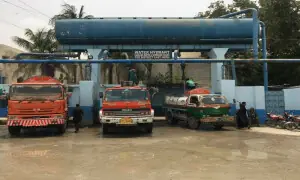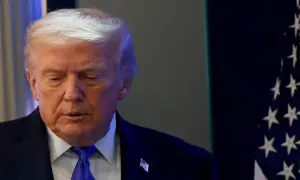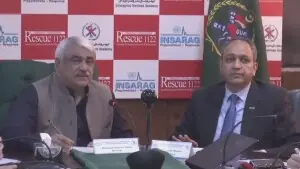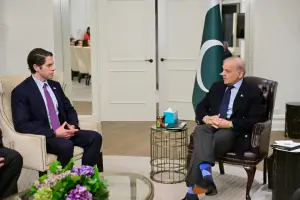Ministry of Commerce to submit new summary on 1,200 stranded trucks at Pak-Iran border
4 min readThe Ministry of Commerce has decided to submit a new summary to the federal cabinet regarding the 1,200 trucks stranded at the Pakistan-Iran border.
This summary will propose the removal of the “Import Form” requirement for imports from Iran and Afghanistan, along with a review of the current barter trade policy.
According to Business Recorder, this development occurred during the first joint meeting of the Senate Standing Committee on Commerce and the Standing Committee on Finance and Revenue, aimed at addressing growing issues related to barter trade with Iran.
Committee Chairman Senator Saleem Mandviwalla directed the Ministry of Commerce to equate imports from Iran under the barter trade framework with the Import Policy Order.
“Nobody has approached Pakistani customs for clearance of any 1,200 Iranian trucks. Therefore, we have no knowledge of the issue,” FBR Member added.
Officials from the Ministry of Commerce reported that the draft summary for the Cabinet has received approval from the State Bank of Pakistan (SBP), but the Federal Board of Revenue (FBR) has yet to provide its feedback, as noted by the Joint Secretary of the Commerce Ministry.
The committee instructed the FBR to present its comments during the meeting.
Subsequently, the Acting Member of Customs from the FBR stated that the board has submitted its feedback, indicating that the exemption from the I-Form requirement falls under the jurisdiction of the Commerce Ministry and the SBP, and that both should reach a mutual decision.
In response to these urgent challenges, the committee unanimously agreed to revise the existing barter trade policy. The new framework will ensure that neither Pakistan nor Iran faces disadvantages in imports or exports.
The draft policy will first be reviewed by the joint committee, after which a formal summary will be submitted to the Federal Cabinet for approval. The committee has requested a report within ten days.
Chaired jointly by Senator Saleem Mandviwala and Senator Anusha Rahman Ahmad Khan, the meeting convened key members from both committees.
However, the committees expressed significant dissatisfaction over the absence of the Secretary of Commerce and the Minister for Commerce, deeming it a serious neglect of parliamentary oversight on such an important national issue.
“The committee will also move a privilege motion against Collector of Customs Quetta, who is not attending the meeting despite directive of the committee,” Mandviwalla warned FBR.
“Countries cannot operate based on stay orders,” Senator Saleem Mandviwalla asserted firmly, emphasizing that the customs authority has become complacent by relying on judicial court orders for trade activities in the country.
Senator Anusha Rahman echoed this sentiment, warning that the Prime Minister’s vision of increasing Pakistan’s trade to $60 billion would remain unattainable if bureaucratic obstacles continued to hinder decision-making.
The committee identified Pakistan Customs as a significant barrier to cross-border trade due to its “irrational” practices. They noted that trade movement was being obstructed by court stay orders, while customs authorities seemed satisfied with the current policy stagnation and resistant to any necessary changes.
Challenges in cross-border trade with Iran
Iranian representatives informed the committee about the serious situation, disclosing that 1,200 trucks—twice the previously reported number of 600—were currently stranded at the Iranian border, resulting in substantial losses for traders on both sides.
The committee identified the crisis’s root cause as confusion between two overlapping trade policies: the Barter Trade Policy, which permits only Iranian-origin goods to enter Pakistan, and the Import Policy Order, which mandates the filing of an I-Form for all imports.
This policy overlap has rendered the barter trade mechanism ineffective and bureaucratic, further complicated by a lack of understanding among traders and the absence of an official banking channel to facilitate financial transactions between the two countries.
Under existing regulations, Iranian transporters moving goods between Taftan and the NLC Dry Port are required to provide a bank guarantee equal to the applicable customs duties and taxes.
However, due to the lack of official financial systems, fulfilling this requirement has become nearly impossible for Iranian drivers.
Officials from the Commerce Ministry acknowledged that the current border trade mechanism is excessively complex, making trade operations difficult and discouraging legal trading practices.
Iranian delegation’s disclosure
Iranian representatives informed the committee that the number of stranded trucks has doubled from the previously reported 600, resulting in significant losses for traders on both sides.
The committee identified the root of this crisis in conflicting policies: one allowing only Iranian goods under the barter trade policy, and the other requiring an “Import Form” for all imports.
Read more
Iran assures justice over killing of eight Pakistanis, Abbas Araghchi phones Ishaq Dar
For the latest news, follow us on Twitter @Aaj_Urdu. We are also on Facebook, Instagram and YouTube.
























Comments are closed on this story.